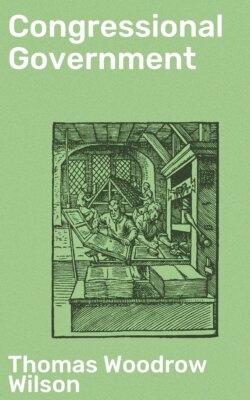Читать книгу Congressional Government - Thomas Woodrow Wilson - Страница 8
На сайте Литреса книга снята с продажи.
Footnotes
ОглавлениеTable of Contents
1 ↑ These are Mr. Bagehot's words with reference to the British constitutional system. See his English Constitution (last American edition), p. 69.
2 ↑ Works, vol. vi., p. 467: “Letter to Jno. Taylor.” The words and sentences omitted in the quotation contain Mr. Adams's opinions as to the value of the several balances, some of which he thinks of doubtful utility, and others of which he, without hesitation, pronounces altogether pernicious.
3 ↑ Federalist, No. 17.
4 ↑ Cooley's Principles of Const. Law, p. 143.
5 ↑ McMaster, Hist. of the People of the U. S., vol. i., p. 564.
6 ↑ Lodge's Alexander Hamilton (Am. Statesmen Series), p. 85.
7 ↑ Lodge's Alexander Hamilton, p. 105.
8 ↑ Its final and most masterly exposition, by C. J. Marshall, may be seen in McCulloch v. Maryland, 4 Wheaton, 316.
9 ↑ The following passage from William Maclay's Sketches of Debate in the First Senate of the United States (pp. 292–3) illustrates how clearly the results of this were forecast by sagacious men from the first: “The system laid down by these gentlemen (the Federalists) was as follows, or rather the development of the designs of a certain party: The general power to carry the Constitution into effect by a constructive interpretation would extend to every case that Congress may deem necessary or expedient. … The laws of the United States will be held paramount to all” state “laws, claims, and even constitutions. The supreme power is with the general government to decide in this, as in everything else, for the States have neglected to secure any umpire or mode of decision in case of difference between them. Nor is there any point in the Constitution for them to rally under. They may give an opinion, but the opinions of the general government must prevail. … Any direct and open act would be termed usurpation. But whether the gradual influence and encroachments of the general government may not gradually swallow up the state governments, is another matter.”
10 ↑ Pensacola Tel. Co. v. West. Union, 96 U.S. 1, 9. (Quoted by Judge Cooley in his Principles of Constitutional Law.)
11 ↑ 18 Stat., part 3, 336. See Ex parte Virginia, 100 U. S. 339.
12 ↑ Sect. 5515 Rev. Stats. See Ex parte Siebold, 100 U. S. 371. Equally extensive of federal powers is that “legal tender” decision (Juilliard v. Greenman) of March, 1884, which argues the existence of a right to issue an irredeemable paper currency from the Constitution's grant of other rights characteristic of sovereignty, and from the possession of a similar right by other governments. But this involves no restriction of state powers; and perhaps there ought to be offset against it that other decision (several cases, October, 1883), which denies constitutional sanction to the Civil Rights Act.
13 ↑ Principles of Constitutional Law, pp. 143, 144.
14 ↑ Marbury v. Madison, 1 Cranch, 137.
15 ↑ Cooley's Principles, p. 157.
16 ↑ For an incisive account of the whole affair, see an article entitled “The Session,” No. Am. Review, vol. cxi., pp. 48, 49.
17 ↑ 7 Wall. 506.
18 ↑ For a brilliant account of the senatorial history of these two treaties, see the article entitled "The Session," No. Am. Rev., vol. cviii. (1869), p. 626 et seq.
